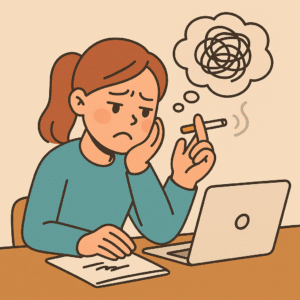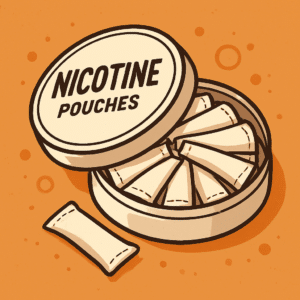Is Nicotine a Depressant?
Introduction – Is nicotine a depressant?
Is nicotine a depressant? That question is becoming more relevant than ever as nicotine use continues to shift away from traditional smoking and into modern alternatives like vapes and pouches. As of 2023, smoking rates in the UK have reached a historic low, with only 11.9% of adults identifying as smokers—a significant decline from nearly half the population in 1974. This downward trend is especially notable among individuals under 25, where smoking rates have dropped from 26% in 2011 to just 10% in 2023. Despite this progress, approximately 6 million adults in the UK continue to smoke, and around 5.1 million people are now using e-cigarettes, including a growing number of individuals who have never smoked before.
Given the evolving landscape of nicotine consumption, it’s crucial to understand how nicotine affects the brain and body. This article delves into the question: is nicotine a depressant? We’ll explore its dual role as both a stimulant and a depressant, its impact on mental health, and the implications for users of various nicotine products, including cigarettes, e-cigarettes, and nicotine pouches.
Read our guide: Where To Buy Zyn In The UK
Understanding Nicotine
Nicotine is legal. It’s in cigarettes, cigars, vapes, and even modern alternatives like Zyn nicotine pouches. Because it’s legal, many people think it’s relatively harmless. But that’s far from the truth.
Legal doesn’t mean safe. Nicotine is one of the most addictive substances available, and it’s deeply tied to mental health, emotional regulation, and brain chemistry. And to really understand whether nicotine is a depressant, we need to explore both its short-term and long-term effects.
Is Nicotine a Depressant?
Let’s get into the core question.
The difference between a depressant and a stimulant
A depressant is a substance that slows down brain activity. It can reduce feelings of anxiety, dull emotions, and decrease your physical responses. Think of alcohol or certain prescription drugs like benzodiazepines—these are classic examples of depressants.
Now, if you’ve ever used a Killa snus or smoked a cigarette and felt more calm or relaxed afterward, that’s the kind of effect we’re talking about.
Read our guide: The Rise Of Killa Snus
Nicotine’s Immediate Psychological Effects
Interestingly, nicotine seems to have both stimulating and depressant effects. Right after consumption, people often feel alert and focused. But that short-lived energy burst is followed by a more relaxed, even sedated, feeling.
So—is nicotine a stimulant or depressant? It’s both, depending on the dose, the timing, and the person’s own physiology. That’s what makes it so tricky and addictive. Your brain gets hooked on this constant see-saw of being boosted and then brought down.
Can Nicotine Help with Focus?
Nicotine is often associated with improved concentration and mental clarity, especially in the short term. That’s one of the reasons many people—especially students, professionals, and even gamers—turn to nicotine products. such as nicotine pouches like Zyn or Killa, the boost in focus can feel immediate and sharp.
Nicotine stimulates the release of dopamine and norepinephrine, two key chemicals that enhance attention and alertness. In the short term, this can make users feel more productive and “on point.” That’s part of what makes products like Zyn nicotine pouches so appealing to people looking for a clean, discreet way to stay focused.
How Nicotine Affects Emotional Regulation
Why Smokers Use Nicotine to Cope with Sadness
Research has shown that sadness—not just stress—makes people reach for nicotine. People who smoke when they’re sad often inhale more deeply and for longer. Why? Because they’ve learned that nicotine temporarily numbs emotional pain.
But that relief comes at a cost. It may blunt your natural ability to process emotions. Think of it like putting a band-aid on a broken bone. You may not see the damage right away, but it’s there.
Emotional Maturity and Adolescent Nicotine Use
Teens and young adults are especially vulnerable. Their brains are still developing, especially the emotional regulation systems. If a teenager starts smoking or using nicotine to deal with sadness or stress, they may never develop healthy coping mechanisms.
And here’s the kicker: most smokers start before age 18. That means nicotine is messing with their emotional maturity from the jump.
The Link Between Smoking, Depression, and Other Drug Use
There’s a reason nicotine is often called a “gateway” substance. People who start with smoking or nicotine pouches may be more likely to try cannabis, alcohol, or even opioids. And yes, many of them report higher rates of depression.
So it’s not just a chemical reaction—it’s behavioral too.
What Does Nicotine Do to the Brain?
You’ve probably heard this question before: what does nicotine do to the brain?
Here’s the simplified version: Nicotine binds to receptors in your brain that normally respond to acetylcholine, a neurotransmitter that influences attention, learning, and memory. It also triggers the release of dopamine, the “feel-good” chemical.
At first, that dopamine surge feels amazing—alertness, euphoria, confidence. But over time, your brain adjusts by reducing its own natural dopamine production and pruning away those dopamine receptors.
The result? You feel less pleasure from everyday things and more dependent on nicotine to feel anything at all.
Read our guide: Zyn Vs Nordic Spirit
Is Nicotine a Stimulant or Depressant?
As we hinted earlier, nicotine sits in a weird grey area between the two.
Stimulant-Like Effects: Alertness, Dopamine, and Addiction
Immediately after taking a hit—whether it’s a cigarette, vape, or Zyn pouch—you’ll likely feel more awake and focused. That’s because nicotine spikes adrenaline, raises your heart rate, and stimulates your nervous system. Classic stimulant behavior.
People even report improved memory and concentration in the short term.
Depressant-Like Effects: Emotional Blunting and Withdrawal
But give it 20 to 30 minutes, and the effects shift. Users often describe feeling relaxed or sedated. That’s when nicotine acts like a depressant, calming anxiety and slowing certain brain functions.
This back-and-forth is what makes quitting so difficult. You’re not just giving up a chemical—you’re breaking a cycle of artificial highs and lows.
Nicotine Withdrawal and Its Emotional Toll
If you’ve ever tried to stop using nicotine, you know it’s no joke. Withdrawal can start just an hour after your last use and includes symptoms like:
-
Irritability
-
Anxiety
-
Headaches
-
Trouble sleeping
-
Mood swings
-
Strong cravings
People often ask, Can you reuse snus to make it last longer? Technically you can, but the nicotine content drops significantly. Plus, reusing it won’t stop the withdrawal symptoms if your body’s already craving more.
The good news? Withdrawal symptoms usually peak within the first week and ease off over time. But for many, quitting requires support—whether that’s therapy, medication, or replacement products.
And if you’re trying to quit and still want a nicotine fix, there are safer ways. Many turn to nicotine pouches UK brands offer as an alternative. These are tobacco-free and come in various strengths.
Curious how long these products last? Read our guide: How long does a Zyn last
Conclusion
So, is nicotine a depressant? The answer isn’t a clear-cut yes or no—it’s both a stimulant and a depressant, depending on how and when it’s used. Nicotine starts by ramping up brain activity, releasing dopamine, and increasing alertness. But shortly after, it can bring on calming, even sedative effects, which is why so many people use it to cope with stress or sadness.
Over time, though, this see-saw effect takes a toll. The brain becomes dependent, emotional regulation weakens, and users may be at greater risk for depression. That’s why it’s so important to ask deeper questions like what does nicotine do to the brain and can nicotine cause depression, especially with new forms of nicotine consumption on the rise.
Whether you’re using Zyn nicotine pouches, trying Killa nicotine pouches, or just curious about how long a Zyn lasts, being informed matters. Products may feel cleaner or more modern, but the nicotine inside still affects your brain the same way.
If you’ve ever wondered can you reuse snus or where to buy snus in the UK, remember—understanding what you’re putting in your body is step one. And now that you know nicotine isn’t just a harmless stimulant, you’re better equipped to make smarter choices.







